
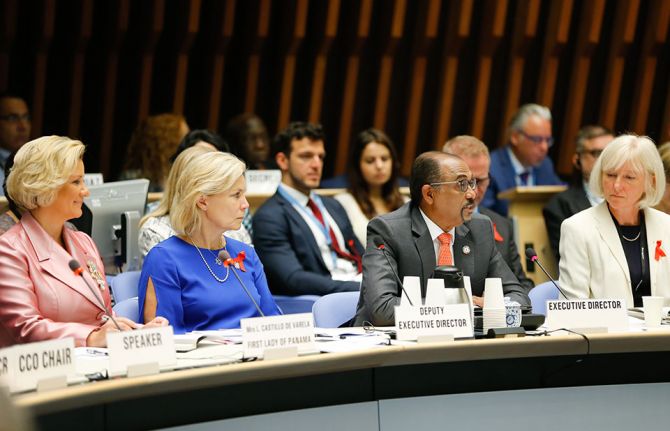
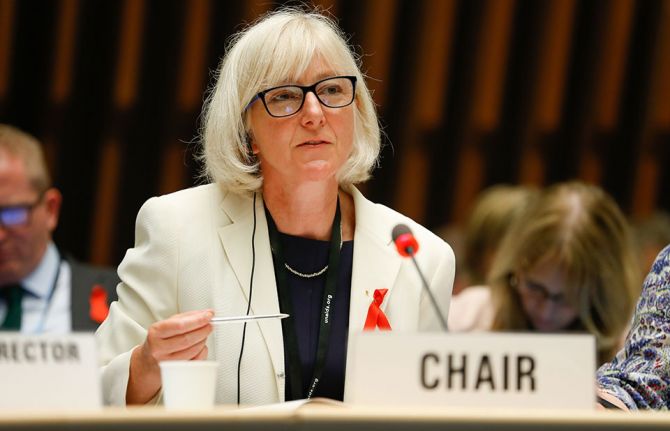
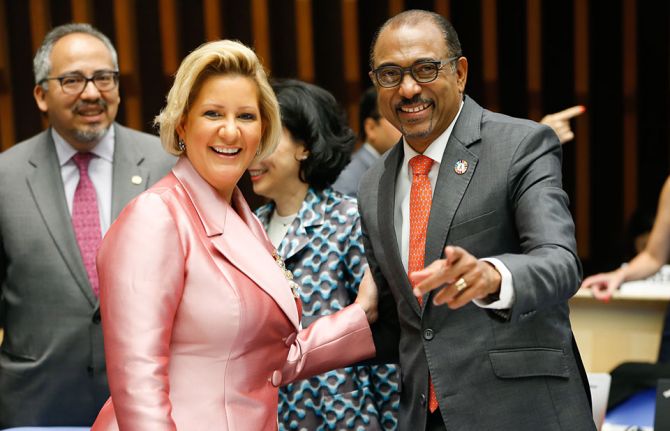
Update
UNAIDS Programme Coordinating Board opens
26 June 2018
26 June 2018 26 June 2018The 42nd meeting of the UNAIDS Programme Coordinating Board (PCB) is taking place in Geneva, Switzerland, from 26 to 28 June.
At the opening, the UNAIDS Executive Director, Michel Sidibé, gave an update on the progress made in the AIDS response and outlined the challenges and opportunities that lie ahead. He stressed that the progress made in the AIDS response is uneven and fragile and called for renewed focus and shared commitment to ending the AIDS epidemic by 2030.
Mr Sidibé also emphasized the need for a transformative approach to the epidemic that will include reforming laws and policies to end discrimination, expand community-led, people-centred approaches to HIV service delivery, the use of timely location–population data to inform decision-making, close the funding gap to achieve the Fast-Track Targets and reinforce the linkages between ending AIDS and achieving universal health coverage.
PCB members were also informed about the proactive actions taken to stamp out sexual harassment, unethical workplace behaviour and all forms of abuse at UNAIDS. These actions include establishing an internal five-point plan to ensure that actions are taken rapidly and effectively against inappropriate behaviour and abuse of authority, but also engaging with external stakeholders, including civil society, to gather valuable inputs on how to strengthen UNAIDS’ work in this area.
Later in the day, the PCB received an update on the process of the establishment of the Independent Expert Panel on prevention of and response to harassment, including sexual harassment, bullying and abuse of power at the UNAIDS Secretariat.
The thematic segment of the meeting will take place on the last day and will focus on ending tuberculosis (TB) and AIDS. The participants will consider the challenges to addressing TB, HIV-associated TB and drug-resistant TB in the context of universal health coverage and the Sustainable Development Goals. The participants will also discuss examples of good practice that demonstrate effective collaboration within national TB and HIV programmes and with communities to achieve integrated TB/HIV care and strengthen health systems.
The 42nd meeting of the PCB is being chaired by the United Kingdom of Great Britain and Northern Ireland, with China acting as Vice-Chair and Algeria as Rapporteur.
Related links
Related

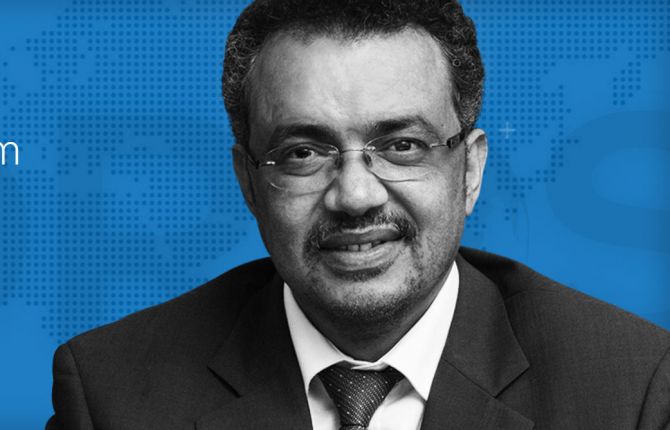
Update
Interview with Tedros Adhanom Ghebreyesus, WHO Director-General elect
24 April 2017
24 April 2017 24 April 2017The World Health Organization Member States elected Dr Tedros Adhanom Ghebreyesus as the new WHO Director-General on 23 May 2017 during the World Health Assembly.Dr Tedros will begin his five-year termon 1 July. Ahead of his election, Dr Tedros talked to unaids.org about the AIDS epidemic and the broader global health landscape.
Question: As Director-General of the World Health Organization, what will be your three priorities to advance progress in ending AIDS by 2030 as part of the Sustainable Development Goals?
Over the last 20 years, we have made tremendous progress on combating AIDS. I commend the advocacy and leadership role of UNAIDS in achieving these results and coordinating and harmonizing the United Nations system’s response to the AIDS epidemic. If elected as Director-General, I will have the following three priorities as part of the health sector AIDS response.
First, I will champion efforts to sustain the progress we have made so far without complacency and to renew our commitments to end AIDS as a public health problem by 2030. The global commitment for the Sustainable Development Goals offers a profound opportunity to tackle the structural, social and economic changes needed to end AIDS. I will ensure the World Health Organization (WHO) is part and parcel of these efforts, working alongside UNAIDS, the United Nations system, Member States, civil society and community groups.
Second, my topmost priority as Director-General of WHO will be universal health coverage, and I will work to ensure that each person living with HIV has access to the HIV prevention, treatment and care services they need. We will give due emphasis to HIV prevention and addressing comorbidities, such as HIV-associated tuberculosis, as well as the growing concern of noncommunicable diseases. Universal health coverage will also help key HIV populations, such as sex workers, men who have sex with men, people who inject drugs, transgender people, migrants and adolescents, reach HIV prevention, treatment and care services. WHO will provide Member States with the normative tools, guidance and support they need to implement these policies.
And finally, I would prioritize building strong, community-based health systems which can design and implement locally tailored prevention and treatment programmes. This will include strengthening primary health-care systems to deliver HIV prevention, treatment and care. Ensuring investment in health systems will not only help us manage HIV/AIDS, it will also support our efforts to prevent and treat other communicable and noncommunicable diseases, as well as prevent and respond to future health emergencies.
Question: How important do you feel the lessons learned in the AIDS response are in shaping the future of global health?
I have no doubt that the lessons we learned in the AIDS response have been critical to shaping the future of global health, both in terms of what we need to do and how we need to do it. The AIDS response first and foremost taught us the importance of political advocacy, community mobilization and determination to overcome despair with ambition and solidarity. The lessons of the AIDS response showed us the value and power of multistakeholder engagement and that we cannot address a health issue at its root only by focusing on the health sector. We also learned that with global solidarity we can innovate and mobilize dramatic domestic and international resources for health, which not only had a profound impact on HIV, but also on the broader health system. For example, when I was a Minister of Health of Ethiopia, we created a 2% HIV Solidarity Fund (a pool fund of 2% salary contributions of civil servants) to initiate our HIV treatment programme. Particularly in the face of changing political climates, we need this type of creativity, commitment and multisectoral response as we work to place universal health coverage at the centre of the implementation of all Sustainable Development Goals.
Question: As the AIDS response has scaled up to reach millions, one of the key challenges has been the lack of community health workers and the capacity of the health system to deliver services at scale. How will you address the challenge of building up the health system to prepare for the next disease outbreak and to meet current health challenges, including AIDS and noncommunicable diseases?
Scaling up community health workers and health system capacity must be a fundamental component of our efforts to achieve universal health coverage, which will be my topmost priority if elected as Director-General. These efforts can build on the tremendous progress made and experiences gained in the last two decades tackling HIV, tuberculosis, malaria, neglected tropical diseases, and child and maternal mortality. As part of this effort, we also need to strengthen primary health-care systems with integrated community engagement to address communicable and noncommunicable diseases, such as cancer, heart disease, chronic respiratory diseases, diabetes and injuries. These efforts will help not only to deliver evidence-based health promotion, prevention, treatment and rehabilitation services, but also to enhance prevention, detection, response and recovery efforts for health emergencies.
As Director-General, I will build on my first-hand experience addressing this capacity gap in Ethiopia to support Member States and national health authorities’ efforts to develop and implement policies aimed at ensuring universal health care. In Ethiopia, for example, our flagship Health Extension Programme deployed nearly 40 000 community health workers in every village of the country. HIV prevention was one of their key activities—a focus which has resulted in a 90% reduction of new HIV infections between 2001 and 2012. WHO has a key role to play in sharing these types of lessons learned across countries. It also needs to help build and maintain partnerships among the diverse group of players involved in global health—country governments, donors, the private sector, civil society and academics—to overcome barriers to achieving universal health coverage, including improving access to quality diagnosis and care, essential drugs and financial protections. Finally, I will also work to put and keep universal health coverage on the agenda at the highest political levels possible, maintaining the political will and resources needed to achieve these goals.
Question: How will you ensure that people affected by HIV, especially key populations, such as sex workers, gay men and other men who have sex with men, people who inject drugs, transgender people and migrants, are not left behind in efforts to achieve universal health coverage?
Our efforts to achieve universal health coverage need to prioritize the needs of the vulnerable and marginalized. Specifically, I believe WHO must champion mechanisms to meaningfully listen to, learn from and engage these groups. This engagement—and what we learn from it—should then be at the centre of our efforts to mobilize resources and hold authorities accountable for the health of all, regardless of age, gender, income, sexual orientation or religion. In addition, it will be essential to improve our evidence base around effective ways to reach the most vulnerable and most marginalized. New research can help us develop data-driven and results-oriented solutions, which will help us maximize the impact of interventions we invest in. Part of this effort will also require us to build and improve the infrastructure for data collection and ensure that the data we collect are used to inform policies. Lastly, WHO is ideally positioned to address inequality in health care, and, if I am elected Director-General, I will be a strong voice and committed champion to ensuring everyone has the right to health care.
Question: What does UNAIDS mean to you?
I will start with a personal note. It has also been a great pleasure and honour to have had a chance to chair the Programme Coordinating Board (PCB) during my time as Ethiopia’s Minister of Health in 2009–2010, and to consider UNAIDS a close partner for more than a decade. It was during my time on the PCB that UNAIDS increased its focus on health systems strengthening and HIV prevention, including country ownership—setting the stage for our universal health coverage efforts. We also worked to implement the new UNAIDS mission statement, which outlined its priorities and vision for the future.
I believe UNAIDS’ provocative leadership has been critical in addressing the AIDS epidemic and converting it from a death sentence to a chronic health condition. Its global role has not only garnered the highest political support for the AIDS response, but also ensured the voices of those affected by HIV and their families are at the centre of the response, including placing civil society within its governance structure. I believe consolidating these experiences will be useful to tackle the structural, social and economic changes needed to end AIDS as part of the Sustainable Development Goals. I also take note of the recent recommendations of the Global Review Panel on the Future of the UNAIDS Joint Programme Model.
If elected Director-General of WHO, I would look forward to continuing our work together and our close partnership.
Resources
Related

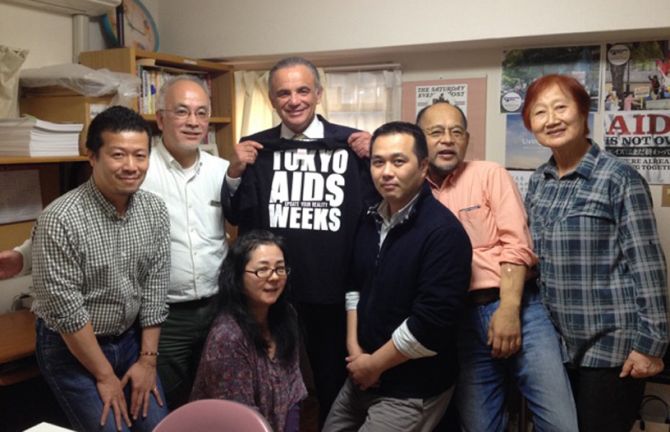
Feature Story
Japan hosts major conference on financing the response to AIDS, tuberculosis and malaria
17 December 2015
17 December 2015 17 December 2015Japan hosted the Fifth Replenishment Preparatory Meeting of the Global Fund to Fight AIDS, Tuberculosis and Malaria (Global Fund) on 16 and 17 December, which laid the groundwork for a pledging conference in mid-2016 at which donors will finalize the Global Fund’s next three-year funding cycle.
The participants included Japan’s Foreign Minister, Fumio Kishida, health ministers from several countries, Margaret Chan, the Director-General of the World Health Organization, Bill Gates, co-chair of the Bill & Melinda Gates Foundation, and Luiz Loures, Deputy Executive Director of UNAIDS.
”We have an unprecedented opportunity in the next five years to break the AIDS epidemic,” said Mr Loures. “If we scale up care, treatment and prevention services and create an environment where people have full access to them we will be on course to end the AIDS epidemic by 2030.”
On the eve of the meeting, Japan also organized a conference on universal health coverage in order to evaluate the financial systems and funding required by countries to promote access to affordable health care and medicine. Universal health coverage is key to ending the epidemics of HIV, tuberculosis and malaria, which are fuelled by poverty, stigma and discrimination.
Japan has been one of the leading investors in the AIDS response, supporting programmes focused on key populations across Asia and investing in projects such as the Kenya HIV Situation Room, which is using cutting-edge technology to provide high-quality data about that country’s epidemic.
While he was in Japan, Mr Loures also visited PLACE Tokyo, which provides community-based services related to HIV and sexual health, including consultation services for people living with HIV.
“The role of communities remains as critical as ever in addressing the realities, needs and challenges of people living with HIV in Japan,” said Mr Loures. “I congratulate PLACE Tokyo for the work they are doing to support people living with HIV, their partners and family members.”
Region/country
Related

Feature Story
Spotlight on the role of the EU in achieving universal health coverage in Africa
16 October 2012
16 October 2012 16 October 2012
L to R: Dr Jan Paehler, Policy Officer, Health Sector, Directorate General for Development and Cooperation – EuropeAid, European Commission, David Evans, Director of the Department of Health Systems Financing at the World Health Organisation, Jean-Marc Chataigner, Deputy Director General, Global Affairs, Development and Partnerships, French Ministry of Foreign Affairs, Laura Shields, journalist and moderator at the Media Coach, Rosemary Museminali, UNAIDS representative for the African Union, UNAIDS, Stefan Seebacher, Head of the Health Department, International Federation of the Red Cross, and Indu Capoor, Director, Centre for Health Education, Training and Nutrition awareness. Credit : EDD
Global health experts came together to discuss the European Union’s role in supporting low- and middle-income countries to reach universal health coverage at the European Development Days (EDDs) conference. The topic for the two-day conference taking place in Brussels from 16-17 October is “Inclusive and Sustainable Growth for Human Development”.
A high-level panel, entitled "Building a Social Contract for Health", discussed what African countries could do to achieve universal health coverage, and how the EU and other developmental partners could support them.
The EU recognises that health is a right for all and an essential objective within the Millennium Development Goals. However, gaps still remain to actually achieving the goal of universal health coverage. The panel agreed on the need for better coordination, and both technical and financial support to ensure the Right to Health for all.
UNAIDS Representative to the African Union, Rosemary Museminali, stressed during her presentation that, "The new roadmap on shared responsibility and global responsibility endorsed by the Heads of States at the African Union Summit represents a milestone, demonstrating their commitment to source African solutions for the response to HIV, TB and malaria.”
"But Africa still needs international assistance,” she added. “European development partners must reinforce global solidarity and support countries in taking the next steps together."
This debate came during a critical period for Europe, when the EU is considering its role in global health, and many member states are taking decisions on international health aid that could have dire consequences for people in the world’s poorest countries.
The new roadmap on shared responsibility and global responsibility endorsed by the Heads of States at the African Union Summit represents a milestone, demonstrating their commitment to source African solutions for the response to HIV, TB and malaria
UNAIDS Representative to the African Union, Rosemary Museminali
Panellists discussed how the EU, working together with its development partners, could ensure inclusive and equitable growth in low- and middle-income countries through promoting a shared responsibility for universal health coverage in the context of its social protection and global health strategies.
“We need to take into account the country needs and the capacity of the country to deliver services but also the commitment of each country to implement the proposed actions,” said Jan Paehler, Policy Officer, Health Sector, Directorate General for Development and Cooperation – EuropeAid, European Commission. “Our support to countries need to be tailored to the needs of each country.”
Participants also explore the role of civil society organizations (CSO) in ensuring the right to health for all. It was seen critical for these organizations to evolve from its traditional role of holding governments accountable into organizations capable of delivering universal health coverage and social protection. For that, partners such as the EU should “invest more in community capacity development to deliver services to their communities, specially the key populations that are hardest to reach by traditional health systems,” said Stefan Seebacher, Head of the Health Department, International Federation of the Red Cross.
The panel was jointly organised by Action for Global Health, Countdown 2015 Europe, IPPF, Marie Stopes International, Oxfam International, The Red Cross, Stop Aids Alliance and UNAIDS. The panel brought together senior representatives from the European Commission, the French Ministry of Foreign Affairs, the World Health Organization, the International Federation of Red Cross and Red Crescent Societies and the India-based Centre for Health Education, Training and Nutrition Awareness.
Organised by the European Commission, the European Development Days (EDD) is Europe’s premier forum on international affairs and development cooperation. This year, it has brought more than 6 000 people and 1 500 organisations from the development community together under the theme of ‘Supporting inclusive and sustainable growth for human development’.







